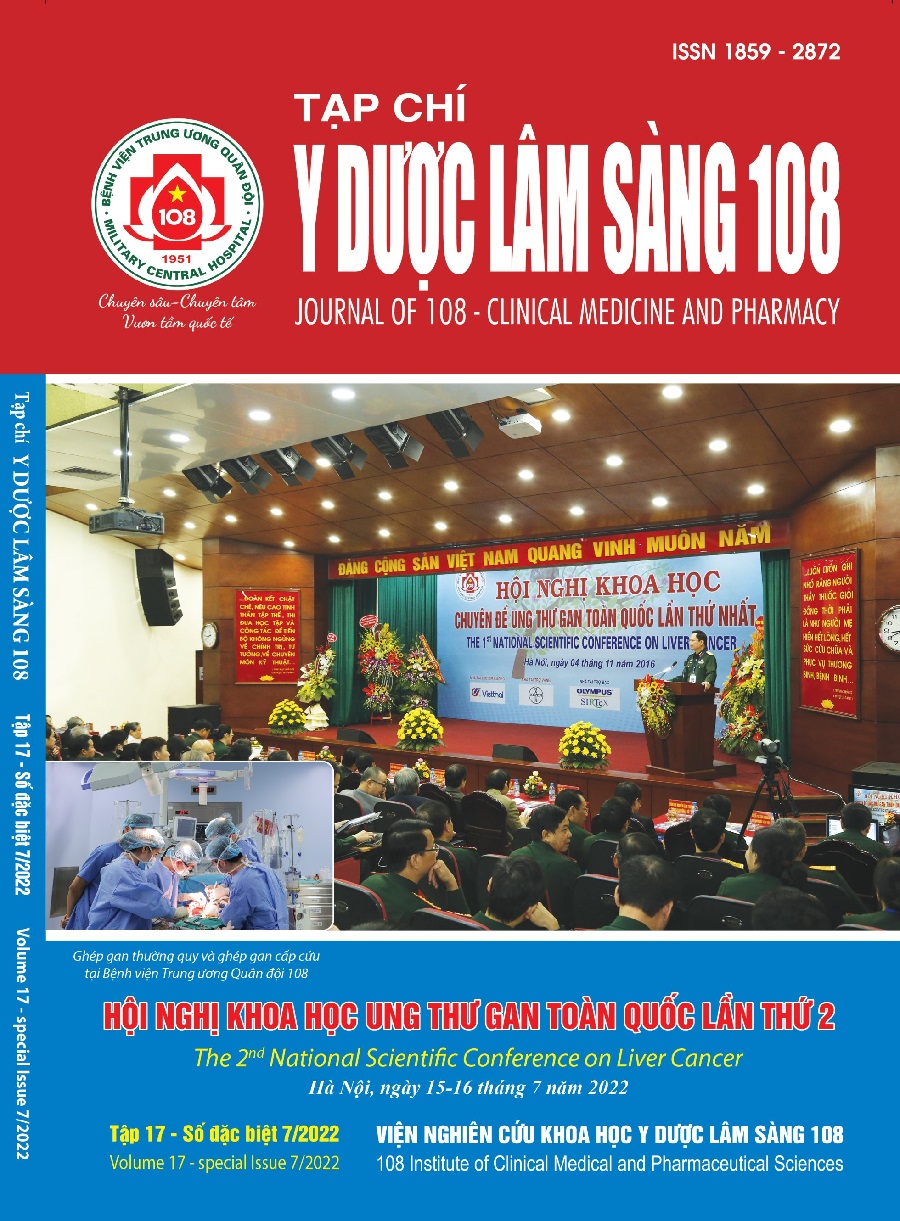Current and new biomarkers of hepatocellular carcinoma
Main Article Content
Keywords
Abstract
HCC was ranked as the sixth most common cancer in the world and was the fourth leading cause of cancer-related deaths. Therefore, the early diagnosis of HCC is essential for the most effective treatments and early detection of recurrence in order to increase the patients’ chances of survival. In addition to imaging devices such as ultrasound, CT, and MRI, biomarkers increasingly play a role in the early diagnosis of HCC. They help to predict hepatocellular carcinoma in cases of chronic hepatitis B, C or cirrhosis, to monitor patients after treatment and to detect recurrences. Along with AFP and AFP-L3, PIVKA II has been widely applied in early HCC detection, as this method provides the best diagnostic result with AUROC at 0.86. With the growing trend of applying markers in early cancer diagnosis, a number of markers continue to be launched such as M2BPGi, HBcrAg, AKR1B10, AXL, GP73, GPC3, etc. Among them M2BPGi and HBcrAg have been used in Viet Nam and they prove to be valuabe in HBV- related HCC management. Every technique and biomarker used to diagnose HCC has their advantages and disadvantages. So it is necessary to know how to use each of them properly, accurately, and effectively.
Article Details
References
2. Phùng Huy Hoàng (2018) Nghiên cứu giá trị của AFP, AFP-L3, PIVKA II trong chẩn đoán ung thư biểu mô tế bào gan. Luận văn bác sĩ nội trú, chuyên nghành nội khoa. Trường Đại học Y khoa Phạm Ngọc Thạch.
3. Tôn Thất Ngọc (2021) Nghiên cứu giá trị của Alpha-fetoprotein, Alpha-fetoprotein- len 3 VÀ Des -gamma- carboxy- prothrombin trong chẩn đoán và điều trị ung thư biều mô tế bào gan. Luận án tiến sĩ y học. Chuyên ngành: Hóa sinh Y học. Trường Đại học Y Hà Nội.
4. Aakash Desai et al (2019) Hepatocellular carcinoma in non-cirrhotic liver: A comprehensive review. World J Hepatol 11(1): 1-18.
5. Marrero JA, Kulik LM, Sirlin CB et al (2018) Diagnosis, staging, and management of hepatocellularn carcinoma: 2018 practice guidance by the american association for the study of liver diseases. Clin Liver Dis (Hoboken) 13(1):1. doi: 10.1002/cld.802.
6. EASL (2018) Clinical practice guidelines: management of hepatocellular carcinoma. Journal of Hepatology 69: 182-236.
7. Bray F et al (2018) Global Cancer Statistics 2018: GLOBOCAN Estimates of Incidence and Mortality Worldwide for 36 cancers in 185 countries. Ca Cancer J Clin 68: 394–424.
8. Francica G, Borzio M (2019) Status of, and strategies for improving, adherence to HCC screening and surveillance. Journal of Hepatocellular Carcinoma 6: 131-141.
9. Lim J, Singal AG (2019) Surveillance and diagnosis of hepatocellular carcinoma. Clinical Liver Disease 13(1): 1-5. doi: 10.1002/cld.761.
10. Partha Pratim Bose, Urmimala Chatterjee (2019) Advances in early diagnosis of hepatocellular Carcinoma. Hepatoma Res 5(24): 1-9.
11. Takako Inoue et al (2020) Novel biomarkers for the management of chronic hepatitis B. Clinical and Molecular Hepatology 26: 261-279.
12. Tiong Sun China et al (2019) Molecular diagnosis of hepatocellular carcinoma: Trends in biomarkers combination to enhance early cancer detection. Hepatoma Res 5(9): 1-14.
 ISSN: 1859 - 2872
ISSN: 1859 - 2872
